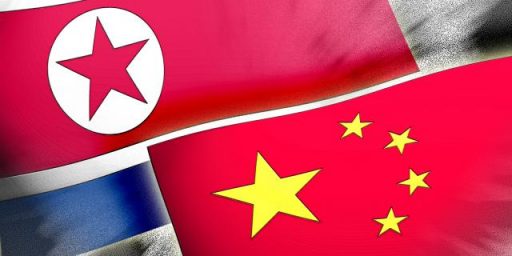Testing to Destruction
Here’s a proposition I hope we never have the opportunity to test. Generals in the People’s Liberation Army apparently have the impression that the PLA can defeat the U. S. military on the field of battle:
For years, Chinese military planning assumed that any attack by the People’s Liberation Army on Taiwan or a disputed island would have to begin with a Pearl Harbor-style preemptive missile strike by China against U.S. forces in Japan and Guam. The PLA was so afraid of overwhelming American intervention that it genuinely believed it could not win unless the Americans were removed from the battlefield before the main campaign even began.
A preemptive strike was, needless to say, a highly risky proposition. If it worked, the PLA just might secure enough space and time to defeat defending troops, seize territory, and position itself for a favorable post-war settlement.
But if China failed to disable American forces with a surprise attack, Beijing could find itself fighting a full-scale war on at least two fronts: against the country it was invading plus the full might of U.S. Pacific Command, fully mobilized and probably strongly backed by the rest of the world.
That was then. But after two decades of sustained military modernization, the Chinese military has fundamentally changed its strategy in just the last year or so. According to Fuell, recent writings by PLA officers indicate “a growing confidence within the PLA that they can more-readily withstand U.S. involvement.”
Their calculations seem to have failed to take our submarine fleet into consideration. Either they are foolhardy or they believe they have a way of neutralizing that fleet.
It’s an interesting post and emphasizes a point too often ignored: all we may really need to do to weather any threat the Chinese might pose to us is wait.






They’re thinking conventional strikes, right? Not nuclear?
Sorry, just rewatched Doctor Strangelove last night, so “preemptive strike” has a nuclear connotation today.
Is there any part of this planet that isn’t going to be involved in conflict?
I really have a hard time seeing the Chinese going to war with the US. #1, We owe them too much money, and #2 we buy too much of their stuff. Their economy could not survive.
@OzarkHillbilly: I really have a hard time seeing the Chinese going to war with the US. #1, We owe them too much money, and #2 we buy too much of their stuff. Their economy could not survive.
You’re making a fundamental error here: you’re expecting rationality. Two of Germany’s biggest trading partners just prior to World War II were France and Russia, and Hitler invaded both.
@Jenos Idanian #13: I think that the group of people running China are a bit more rational than the guy with the funny moustache.
Now, if it were North Korea with the same level of armament….
@Jenos Idanian #13: Comparing the Chinese leadership to Hitler is not exactly an apples to apples comparison. The Chinese Communist leaders are scared to death of their populace. Imagine how the people of China, not to mention the leadership, who have vast sums of money invested in the US would feel when told that all that money is gone. Hitler was a certifiable loonytunes idiot, I have seen absolutely no evidence that the Chinese are.
I think that what we’ve got to worry about is that the Chinese military and the Chinese leadership aren’t synonymous.
@Jenos Idanian #13:
Actually, I think the relevant difference between the two situations is that Hitler intended not just to invade France and Russia, but to incorporate them into a German empire. Thus, the trade and economic relations of those places with Germany would continue, under conditions far more favorable to Germany.
Whatever kind of aggression against American interests that the Chinese might fantasize about, I highly doubt that they think that they may end up ruling over the United States, or incorporating us into a Chinese empire. So they must know that the trade, and their owed money would disappear.
“Growing confidence” and “more readily withstand” sound a deal short of 100%, and more like justification for more funding.
@Jenos:
Correct, sir. What’s completely rational for you is not necessarily the same for me since we may not be reasoning from the same start point or with the same rules. While I personally can’t see China being that dumb, I’m not Chinese nor am I in power. One can be completely logical and come up with some truly off-the-rails results…..
Huh… The title “Testing to Destruction” made me think we’d gotten to the bottom of the F-35 fire. I guess that one’s still a mystery though.
About the rising confidence of the Peoples Liberation Army, meh. Back in (I think) the late ’70s I read a book written by a Soviet Air Force pilot who’d defected with (again, trusting memory) a MIG29 for the CIA to investigate. He wrote about the living conditions in the Soviet Pacific Area headquarters. His apartment building had been built on permafrost and when the foundation inevitably shifted the several-story building developed a crack in the wall of his apartment that he could have fallen out of. Their solution? Steel cables and turn-buckles that could be tightened as needed to keep the crack nearly closed.
That was housing for a wing commander.
I decided that the only way the US could lose to the Soviets was by letting them get into an actual war with us in which they could land a successful pre-emptive strike.
Let time take it’s course. The PLA will end up like that huge war machine lurking on the other side of the Fulda Gap.
Any nation’s military might spend some time and effort fighting an external enemy from time to time, but everyday and all the time they fight for their nation’s budget against their compatriots who wish to spend the money on infrastructure, healthcare, and education. Please see Gen Eisenhower on these points.
BTW, on his recent visit to Japan, Obama gave assurances to Japan in their dispute with China over some islands. The last time these two fought, the US backed China. I have trouble thinking of a compelling reason to switch.
@JohnMcC: That was Viktor Belenko, and he defected with a MIG-25, which was disassembled and then returned to the Soviets in crates. They weren’t very happy about that. I read his autobiography as well.
@Jenos Idanian #13:
You’re making a fundamental error here: you’re expecting rationality.
That’s not an error. The Chinese government is a highly rational one, and has been for quite some time.
OK, let me put it a slightly less Godwiny way:
They don’t think like we do, and we don’t think like we do.
That’s not an assertion of superiority, but an acknowledgement of fact.
The US and China don’t have a common history, a set of common values, shared goals, shared ideals, shared principles. The fundamental basis of our relationship boils down to “we like cheap stuff” and “they like our money.”
One factor that may come into account in the future is that the Chinese are sending a LOT of their younger people to the US for college. Another factor is that a lot of Americans are going to China to work with manufacturers. In a generation or two, there will be quite a few people in both countries who have a pretty good understanding of the other who will be of a leadership age.
But in the meantime… we fundamentally don’t understand them, and they fundamentally don’t understand us. And those kinds of misunderstandings lead to bad things… like, for example, World War I. No one wanted the biggest war in history, but they got it anyway.
@Jenos Idanian #13:
Who do you mean by “we.” If you’re talking about the common person in the street, I totally agree. That’s also true about the Soviets and other in the past.
But this is true of our understanding of our allies as well — the folks we share a so-called “common history” with.
Hell, its probably true even if we stay within the US.
In that there are a lot of people on both sides of the Pacific who’ve spent a lot of time understanding each other. Years. And typically they are the ones who point out — for example — that before China could deal with the US, it would have to finish all the internal colonial wars its still fighting.
What you hope is that — in much the same way that the people in the US who understood the Soviets knew by the early 1980’s it wasn’t *if* the USSR would collapse, it’s *when* — it’s the people who actually know China that are setting our overall policies.